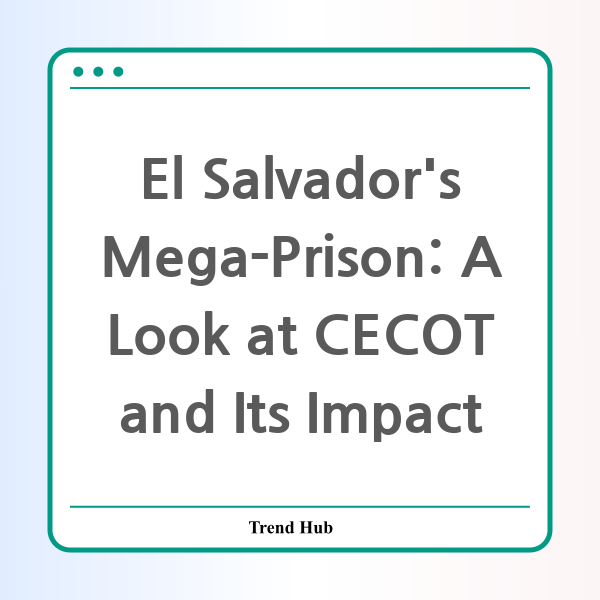* This website participates in the Amazon Affiliate Program and earns from qualifying purchases.

What Does El Salvador’s Mega-Prison Mean for the Future of Crime and Punishment?
In the heart of Central America lies El Salvador, a country that has taken drastic measures in its battle against crime. It is here that the Terrorism Confinement Center (CECOT) has been established, a mega-prison that symbolizes the nation’s shift in tackling crime and rehabilitation. With the recent announcement of a deal involving U.S. citizens potentially being sent to this facility, it has sparked discussions about the implications for both El Salvador and its policy on crime.
The CECOT, located in Tecoluca, is designed to house up to 40,000 inmates, with reported numbers that might exceed this intended capacity. The prison operates without typical rehabilitation programs; inmates are packed into cells designed to hold 65 to 70 people, lacking adequate facilities for education or personal development. This stark environment has been a topic of intense debate among human rights advocates and policymakers alike.
Key Features of CECOT:
- Capacity: Designed to hold up to 40,000 inmates.
- Living Conditions: Overcrowded cells where inmates have no outside access or family visits.
- Programs: Minimal engagement activities, focusing primarily on motivational talks from trusted inmates.
- Administration Perspective: The government believes that these severe conditions are essential for maintaining public safety and deterring crime.
Since President Nayib Bukele launched his crackdown on gangs in March 2022, over 84,000 arrests have been made. This aggressive stance has positioned El Salvador as an outlier in Central American politics, where crime rates have long been a concern. Bukele touted his strategy as having transformed El Salvador from one of the world's most dangerous countries into the safest in the Americas. However, the harsh realities of the CECOT expose a conflicting narrative regarding human rights and rehabilitation.
Critics argue that the approach taken by the Bukele administration undermines the potential for rehabilitation and addresses the underlying social issues that contribute to crime. Reports from human rights organizations indicate that many individuals detained during the gang crackdown have been subjected to human rights violations, raising alarms about the balance between security and civility.
The U.S. Involvement:
Recent developments have introduced the prospect of the U.S. sending inmates to El Salvador under a deal brokered by Senator Marco Rubio. While the U.S. constitution prohibits the deportation of citizens, the arrangement has led to questions about the ethical implications of such a move. It poses a challenge not just to El Salvador’s prison system but also to its international relations and image.
What Lies Ahead?
As the ongoing debates on crime, safety, and human rights continue, the future for El Salvador’s CECOT remains uncertain. Will the mega-prison become a model for managing crime in the region, or will it serve as a cautionary tale about the excesses of an authoritarian approach? The reality of overcrowded prisons without rehabilitation poses significant challenges for a country that desperately seeks stability.
Ultimately, the conversation must shift towards considering how societies can prevent crime without sacrificing the very values they seek to uphold, ensuring that institutions like CECOT do more than confine bodies—but rather, promote a path toward healing and reintegration into society.
As El Salvador grapples with these difficult questions, the world watches closely, with implications extending far beyond the borders of this small nation.
* This website participates in the Amazon Affiliate Program and earns from qualifying purchases.